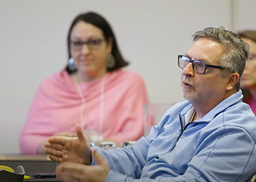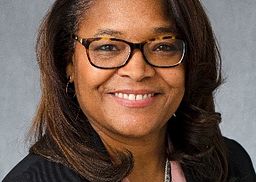Christina M. Ventura Shares Her Story of Coming Out as a PA Educator

Christina M. Ventura, DrPH, assistant professor of PA studies at Hofstra University, is passionate about public health, research, and teaching PA students to offer holistic and patient-centered care. Almost two years ago, she came out to her Hofstra colleagues and students, and this Pride Month, we had the honor of hearing Christina tell her story. Keep reading to learn about how she navigated coming out as a PA educator, why she believes mentorship and authenticity matter, and her advice for fellow PA educators and students.
Tell us about your experience in PA education.
I have been a PA educator at Hofstra University in New York for six years. As an epidemiologist, I am passionate about teaching my students that their patients are people outside of the exam room. For example, if a patient is not adhering to their medication, it’s not because they just don’t want to listen. It could be that they can’t afford it or that they didn’t understand the instructions. I want all my students to understand the social determinants of health – to be aware of patients’ lived experiences, to know the system is broken, but that they can do their part to change it by becoming inclusive providers.
In PAEA’s Sexual and Gender Minority Professional Learning Community, you shared that you came out as a PA educator. Would you feel comfortable sharing your story?
I grew up in a religious environment, and though internally I identified as bisexual, it never even occurred to me that I could be gay. I just thought it was a part of me that I couldn’t share. I had been married to a man, and had two beautiful children. I realized that I was looking for something deep in me, and was separated from him for a few months when I met my now fiancée. It hit me like a ton of bricks. The first day I met her, I was head over heels, and that felt very liberating. But because I’d been married to a man, I did not feel like I earned the title or like I could say I was a lesbian.
At that time, I almost had my doctorate, and I had a great job as a PA educator. After a while, I just wanted to talk about my fiancée. I would bring her name up in conversation without explicitly mentioning that we were together. When I finally told my colleagues, every one of them was so accepting. But the hardest part for me was telling the students. I sent the class an email and shared my story. I was terrified, but they sent me the kindest emails in response – it felt even better than when the faculty accepted me. I just cried reading their messages as they came in.
As a PA professor, you’re there to be a good educator, so it can be scary to be vulnerable in that way. But I want to be authentic and show them that it’s normal, and that I am living a good, full life. I think that’s so important.
What do you want others to know about your experience?
It’s important to realize how taxing it is to come out to every staff person as a faculty member, and just to talk about your relationship. It was so hard to come out to the students, and I will share this with a new cohort of students every year. Every year, I will have to determine when and how to share this information. My fiancée and my life mean everything to me, so I won’t share this information frivolously. Many people in heterosexual relationships don’t have to think about these things, so it’s important to remember the different considerations that your sexual and gender minority friends, students, and colleagues hold every day.
What would you say to a student or colleague who is struggling?
No LGBTQ+ person should feel a burden to be a mentor or a spokesperson. You don’t have to explain yourself to anyone. It’s your story, and it should be told on your terms. Even if you’re going to a Pride Parade, you still don’t owe anyone anything. It is your life and your truth – hold it as a precious gift that is yours to give on your terms and when you feel safe.
If you do want to start telling people, I would encourage you to start with a close friend – someone you know will love and accept you no matter what. Then, if you feel safe, you can begin telling your colleagues or fellow students. I wish my coming out had glitter and streamers – I really do, because I would have enjoyed that – but it doesn’t have to be epic and dramatic. You’re not a fraud if you don’t feel comfortable being open about it, because you own your narrative and no one can take that away from you, whether you’re an educator or a student.
What do you hope to see in the future?
I hope to see more resources for PA educators who are sexual and gender minorities. I want to see the PAEA Sexual & Gender Minority/LGBTQ+ Health Special Interest Group grow, and to see safe zone resources and mentorship programs for PA faculty and staff. I thought something was wrong with me for such a long time, and I think about how helpful it would have been to hear that everything would be okay.




